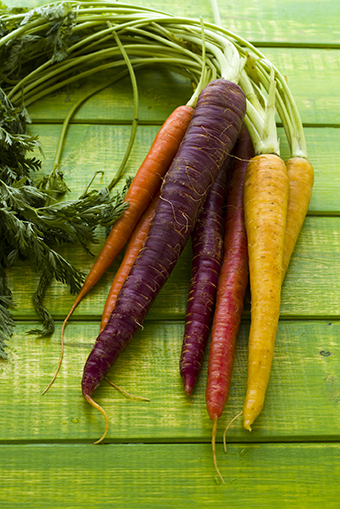Bugs Bunny would be pleased to learn that purple carrots deliver quiet a different list of nutrients than their orange, yellow and white counterparts.
The antioxidant level in purple carrots is five as high as in white or yellow carrots. Each serving of purple carrots delivers a sizable helping of anthocyanin – which is believed to build up your resistance to both inflammation and diabetes. Granted, you would get more anthocyanin from a similar sized helping of blueberries or plums (both renowned for their antioxident qualities), but since carrots are less expensive than those fruits, the carrots would be more economical.
“Antioxidants such as those found in purple carrots are important for good health,” says U of Guelph professor Mary Ruth McDonald. “Having a lot of fruits and vegetables in your diet reduces the risk of chronic diseases, such as heart disease, stroke, Type 2 diabetes and several cancers. They do all kinds of good things.”
According to the University of Guelph’s Research Magazine, purple carrots were the most common until farmers began deliberately breeding orange carrots in the 1600s.
That doesn’t mean people should stop eating orange carrots. Carrots of each colour have health benefits: orange carrots contain beta-carotene; red carrots lycopene; white carrots phytochemicals; and yellow carrots xanthophylls. And while most fruit typically lasts about a week unspoiled, root vegetables such as carrots can be stored for up to eight months. McDonald is the only researcher in Ontario specifically studying carrot production. People turn to her to solve problems. Most recently, her research team has been conducting trials with animals and humans to determine if eating purple vegetables actually provides health benefits. This is ground-breaking research, and McDonald wants people to know about the advantages of purple carrots so they can eat more and reap the health benefits.









